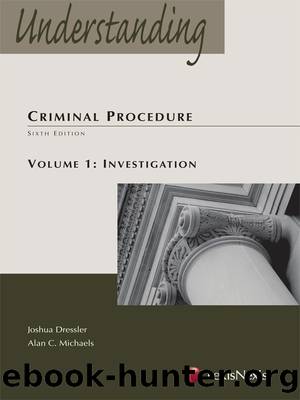Understanding Criminal Procedure by Joshua Dressler

Author:Joshua Dressler
Language: eng
Format: epub
Publisher: LexisNexis
Published: 2013-09-14T16:00:00+00:00
§ 18.05 “SPECIAL NEEDS” SEARCHES AND SEIZURES50
[A] In General
An increasingly significant exception to the Fourth Amendment principle that searches and seizures are unreasonable if they are not authorized by a warrant and/or supported by probable cause is the so-called “special needs” (or “special governmental needs”) doctrine. This exception applies when “special needs, beyond the normal need for law enforcement, make the warrant and[/or] probable-cause requirement[s] impracticable.”51 Although the early cases only dispensed with the warrant and/or probable cause provisions of the Fourth Amendment, more recent cases have authorized suspicionless searches.
Professor William Stuntz has observed that “little or no effort has been made to explain what these ‘special needs’ are; the term turns out to be no more than a label that indicates when a lax standard will apply.”52 Essentially, when the Court determines that “special needs” exist, it evaluates the governmental activity — the special need — by the general “reasonableness” balancing standard. Nearly always, the government interest “trumps” the requirements of a warrant and/or probable cause or even reasonable suspicion.53
Two initial points are worth making here. First, although the Supreme Court has often treated the administrative search, border search, and checkpoint cases separately from the “special need” cases, there is little or no reason for this distinction. Those cases involved specific governmental interests — special needs, if you will — beyond ordinary criminal investigations. Moreover, the process of determining the legitimacy of the governmental action is the same: application of the “reasonableness” balancing standard.
Second, despite the shared justification and standard for these doctrines, the Supreme Court recently stated that the “special needs” exception does not apply [308/309]when “the immediate objective” of the search is “to generate evidence for law enforcement purposes,” even if the “ultimate goal” is to promote some value other than general crime control.54 Most “special needs” cases have involved searches conducted by persons others than police officers, which has made it easier for the Court to conclude that a special need, beyond ordinary criminal law enforcement, justified the special rule. “Extensive entanglement of law enforcement” in the process, however, jeopardizes a “special needs” claim.
Download
This site does not store any files on its server. We only index and link to content provided by other sites. Please contact the content providers to delete copyright contents if any and email us, we'll remove relevant links or contents immediately.
The Borden Murders by Sarah Miller(3590)
The Secret Barrister by The Secret Barrister(3009)
Coroner's Journal by Louis Cataldie(2101)
Police Exams Prep 2018-2019 by Kaplan Test Prep(2034)
The Splendid and the Vile by Erik Larson(1782)
Terrorist Cop by Mordecai Dzikansky & ROBERT SLATER(1719)
My Dark Places by James Ellroy(1504)
A Colony in a Nation by Chris Hayes(1500)
Black Klansman by Ron Stallworth(1442)
A Life of Crime by Harry Ognall(1381)
Objection! by Nancy Grace(1330)
Whoever Fights Monsters by Robert K. Ressler(1322)
The New Jim Crow by Michelle Alexander(1316)
American Prison by Shane Bauer(1288)
Obsession (The Volkov Mafia Series Book 1) by S.E Foster(1278)
Anatomy of Injustice by Raymond Bonner(1268)
The Art of Flight by unknow(1265)
A Higher Loyalty by Comey James(1241)
A is for Arsenic: The Poisons of Agatha Christie (Bloomsbury Sigma) by Kathryn Harkup(1214)
